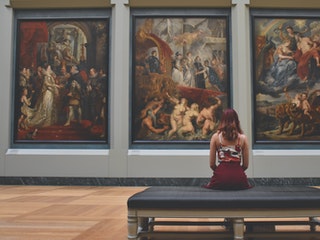More than perhaps any other period in recent history, our time is characterised by technological change and progress.
Rarely has technology shaken our self-image - our "being human" - so directly:
More than perhaps any other period in recent history, our time is characterised by technological change and progress.
Rarely has technology shaken our self-image - our "being human" - so directly:

Virtual and augmented reality raises the age-old question of whether we can understand our perception as a representation of an objective reality, or whether our perception is just a composition of different illusions.
And thus the concept of the existence of an "objective reality" is again up for discussion.

Blockchains are on everyone's lips these days. Bitcoin is certainly the best-known buzzword in this context.
NFTs (Non-Fungible Token) are based on the same concept and are beginning to conquer their permanent place in the (digital) art scene. They allow the authenticity and originality of digital art to be confirmed and are therefore an important new tool for both collectors and artists,

Everything that we subsume under the heading of "Artificial Intelligence" is beginning to relativize the uniqueness of the cognitive abilities of the human brain at an alarming rate.
While the public perception of computers has so far been that they are mainly "fast calculating machines", digital structures based on the structure of biological brains are developing more and more and ever faster capabilities that we understand to be exclusively human:
Artificial intelligences translate, write texts, design products, produce paintings and compositions. Creativity and the power of association are being digitised.

In contrast to technological development, which is increasingly accelerated, cultural development is always a "continuity in change" - cultural change is always more ponderous, more diverse and less directed than technological progress.
Against this background, we have made it our task to build a lasting bridge between culture, art and technology, and thus to contribute to maintaining a mutually beneficial exchange between these two forces that are so influential in civilisation, and to ensure that art and technology do not cease to understand each other.
We support participants in the art market in understanding digital transformation processes as an opportunity and in successfully implementing them.